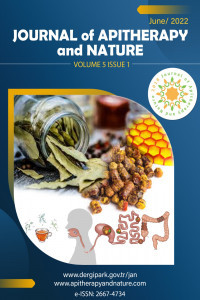The Biological Activities of Indonesian Propolis and It’ s Molecular Marker
The Biological Activities of Indonesian Propolis and It’ s Molecular Marker
Indonesian Propolis, Molecular Marker, Candida albicans,
___
- 1. Sonia MF, Marcia CDF, Daiana TO, Marina BM, Sidney AVF, Rachel BC (2018) Biological Activities of Red Propolis: A Review. Recent Patents on Endocrine, Metabolic & Immune Drug Discovery (in press).
- 2. Mahadewi AG, Christina D, Hermansyah H, Rohmatin E, Sahlan M (2018) Selection of discrimination marker from various propolis for mapping and identify anti Candida albicans activity. AIP Conference Proceedings 1933, 020005
- 3. Pratami DK, Mun’im A, Sundowo A, Sahlan M (2018) Phytochemical profile and antioxidant activity of propolis ethanolic extract from tetragonula bee. Pharmacognosy Journal 10 (1) :128-135
- Yayın Aralığı: Yılda 2 Sayı
- Başlangıç: 2018
- Yayıncı: Oktay YILDIZ
Caseinates Loaded with Red Propolis Extract
İsabel Cristina Celerino De Moraes PORTO, Clinston Paulino De ALMEIDA, Nataly Miranda Do NASCIMENTO, Amanda Barbosa WANDERLEY, João V. Lessa De OLIVEIRA, Felipe J. L. Barbosa Dos SANTOS, Valdemir Da Costa SILVA, İrinaldo Diniz BASÍLIO-JÚNIOR, Giselda Macena LIRA, Marta Maria Da CONCEIÇÃO, Ana Flávia
María İnmaculada GONZÁLEZ-MARTÍN, Eddy Valentín BETANCES-SALCEDO, İsabel REVILLA, Ana María VIVAR-QUINTANA
Antimicrobial Effect of Commercial Propolis Extract (BEEO©)
Aslı Elif TANUGUR, Sevgi KOLAYLI, Merve KESKIN, Sengul ALPAY KARAOGLU
Chemical Composition of Selected Propolis Samples from Kyrgyzstan and Kazakhstan
Argyro PETROPOULOU, Konstantia GRAIKOU, Jaroslaw WIDELSKI, Krystyna SKALICKA-WOŹNIAK, Zuriyadda SAKIPOVA, İoanna CHINOU
Isolated Triterpenes from Stingless Bee Lisotrigona furva Propolis in Vietnam
Le Nguyen THANH, Vu Thi Kim OANH, Ha Thi THOA, Diep Thi Lan PHUONG, Nguyen Thi Phuong LIEN, Tran Huu GIAP, Nguyen Thi Minh HANG, Nguyen Van HUNG, Vassya BANKOVA
The Characterization and Bioactive Composition of Turkish Propolis
İlknur COSKUN, Gizem M. DUYMAZ, Tuğçe DASTAN, Ozge E. SONMEZER, , Sezer ACAR, Emir AKYILDIZ, Gamze DUZ, Ozlem YILMAZ, Sinem RADAY
ARC (Apiceutical Research Centre): Exploring a New Generation of Medicines from the Beehive
Portuguese Propolis: A Potenial Source of Environmentally Friendly Fungicides
Catarina PASSÃO, Claudia RODRIGUES, Cristina Almeida AGUIAR, Ana CUNHA
Hristo PETKOV, Boryana TRUSHEVA, Milena POPOVA, Vassya BANKOVA
Hugo ALVES, Catarina PASSÃO, Maria João SOUSA, Cristina Almeida AGUIAR, Ana CUNHA, Rui Pedro OLIVEIRA
